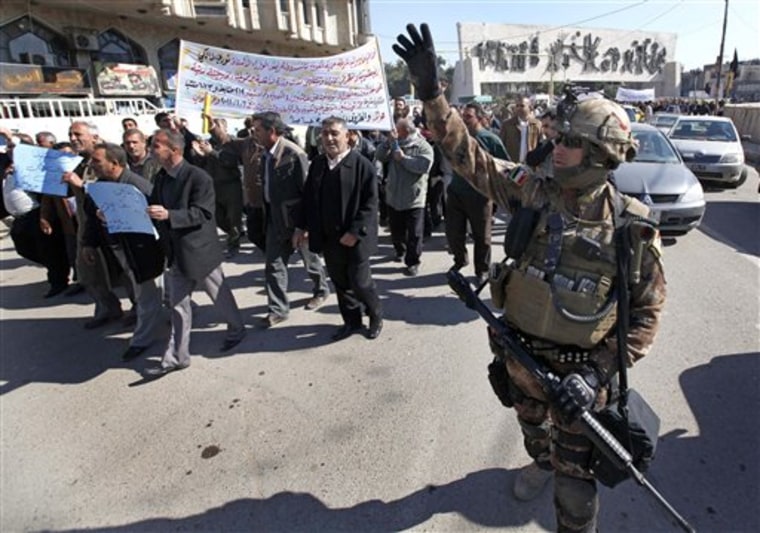Protesters scuffled with riot police and marched along sewage-filled streets in demonstrations across Iraq on Sunday to demand better utilities and job security from their government.
Authorities estimated several thousand protesters turned out in Baghdad, Basra, Ramadi and a small town in Iraq's eastern Diyala province. They were galvanizing on popular uprisings across the Mideast to repeat long-standing complaints about Iraq's limited electricity, shoddy water and sewage services, and potential layoffs in government jobs.
"Our children have many diseases because of sewage problems and accumulated trash in the area," said Ali Hassan, a resident of Boub al-Sham, where more than 1,000 protesters gathered amid stagnant pools of water and a stench of waste in the air. The Diyala town is located about 15 miles (25 kilometers) northeast of Baghdad.
In the southern port city of Basra, around 1,500 demonstrators got into a shoving match with riot police who lined up to protect the provincial government headquarters.
A small delegation of the protesters met with Basra provincial officials to present a list of demands, including better electricity, more jobs and a crackdown on crime and corruption in Iraq's second-largest city.
Makki Jassim al-Timimi, who led the Basra protest, said government officials promised to answer their demands within 2 weeks."
While protests in Iraq so far have come nowhere close to the scale or intensity of those in Egypt or Tunisia, they nonetheless have unnerved government officials. Prime Minister Nouri al-Maliki this week announced he would not run for a third term and that he would return half his salary to the treasury in an effort to close gaps between Iraq's politically privileged and its poor.
In a press conference Sunday, al-Maliki said he would increase monthly food rations for all Iraqis by about 15,000 Iraqi dinars, or about $12. He also rejected the use of violence against demonstrators, noting that "we have to look at the protests in a civilized way and we should deal properly with the demands."
Baghdad political analyst Hadi Jalo said it's unlikely that Iraq's protests will compare with others in the Middle East because the government has enough money to ease complaints in limited ways, like paving roads or installing power generators in some neighborhoods.
___
Associated Press writers Sinan Salaheddin, Karim Kadim and Mazin Yahya in Baghdad and Sameer N. Yacoub in Amman, Jordan, contributed to this report.
